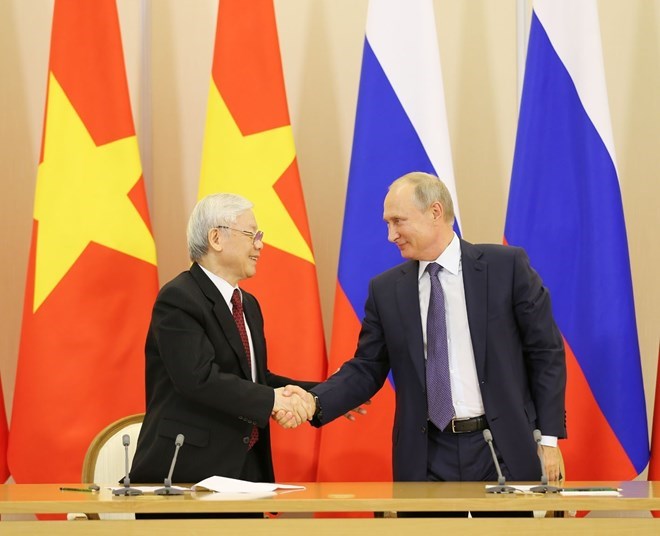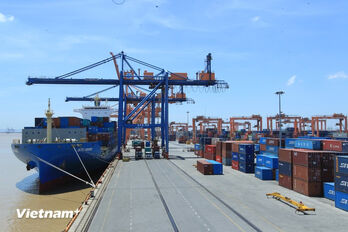Vietnam, Russia issue joint statement

CPV General Secretary Nguyen Phu Trong (L) and Russian President Vladimir Putin (Photo: VNA)
Vietnam and Russia issued a 40-point joint statement on the official visit to Russia by General Secretary of the Communist Party of Vietnam (CPV)’s Central Committee Nguyen Phu Trong from September 5-8, made at the invitation of Russian President Vladimir Putin.
The joint statement highlighted Vietnam-Russia relations, regional and international issues, and the discussion points between the two countries’ leaders.
During his trip, the Vietnamese Party leader held talks with President Putin and met Prime Minister Dmitry Medvedev, Chairman of the State Duma of Russia Vyacheslav Volodin, and Deputy Speaker of the Federation Council of Russia Andrey Turchak.
He laid wreaths at the Tomb of the Unknown Soldier, the Vladimir Ilyich Lenin Mausoleum, and the Statue of President Ho Chi Minh in Moscow. He also attended a ceremony to celebrate the 60th founding anniversary of the Russia-Vietnam Friendship Association as well as meetings with Russian veterans and experts who have worked in Vietnam, and visited Kaluga province.
During the talks and meetings, leaders of the two countries discussed how to further develop the Vietnam-Russia friendship and all-round cooperation, as well as international and regional issues of their common concern.
General Secretary Trong and President Putin affirmed the consistent policy of strengthening the comprehensive strategic partnership between the two countries in order to meet the long-term interests of their peoples, and agreed on the importance of maintaining joint efforts to promote cooperation in all areas.
The two sides highly valued the regular and substantial political dialogue, across channels from the National Assembly, Government, ministerial and sectorial levels, localities, political parties and social organisations.
The two leaders emphasised the significance of the thorough preparation of activities for the Vietnam Year in Russia and the Russia Year in Vietnam, taking place in 2019, which are hoped to contribute to promoting bilateral cooperation across many sectors.
The two sides expressed their satisfaction with the development of defence-security and military cooperation, the field that holds a special role in the Vietnam-Russia relationship, while affirming their determination to consolidate and expand ties in these fields in the spirit of a comprehensive strategic partnership, on the basis of international law and laws of each country.
Both sides highly appreciated the coordination role of the Vietnam-Russia Intergovernmental Committee on military technical cooperation and the Defence Strategic Dialogue mechanism at the deputy ministerial level between the two countries’ defence ministries.
The leaders stressed the need for radical efforts to boost economic and trade cooperation, firstly overcoming any current problems, improving the cooperation mechanism, and effectively implementing the Free Trade Agreement between Vietnam and the Eurasian Economic Union as well as its member nations, signed on May 29, 2015, as well as other documents between Vietnam and Russia, towards creating a breakthrough in bilateral trade and investment collaboration.
They highly valued the important role played by the Vietnam-Russia Intergovernmental Committee for Economic, Commercial, Scientific and Technological Cooperation, and its working groups in promoting cooperation, while emphasising the importance of improving the performance of the committee, including coordinating to supervise the implementation of agreements reached between the two countries, and identifying new priorities for cooperation, focusing on cooperative projects with a high technology content.
The two sides highlighted the need to improve the effectiveness of activities of the Vietnam-Russia Senior Working Group on priority investment projects in order to develop and implement projects in the fields of industry and electrical energy; mining and mineral processing; agriculture; information and telecommunications; and urban and transport infrastructure in localities all over of Vietnam.
They asserted their determination to expand cooperation in building a nuclear science and technology centre in Vietnam, as well as training Vietnamese students in Russia, who are pursuing subjects related to the use of atomic energy for peaceful purposes.
The two sides agreed that in the case that Vietnam restarts its plan to build the national atomic energy sector, Russia will be considered a priority partner in this field.
Both sides applauded and highly appreciated the implementation of joint projects in the field of oil and gas, affirming to continue creating favourable conditions for Vietnamese and Russian enterprises to expand their operations in the field in the territory of both nations.
The leaders agreed to expand the exploration and exploitation of oil and gas on the continental shelf of Vietnam, in accordance with international law such as the United Nations Convention on the Law of the Sea 1982 (UNCLOS 1982).
The two sides emphasised prospects for their cooperation in power energy, especially the advantages of Russian firms participating in Vietnamese projects on the modernisation and rebuilding of old energy facilities.
The Vietnamese Party leader and the Russian President agreed on measures to foster collaboration on motor vehicle manufacturing.
The two leaders acknowledged the need to reinforce cooperation in agriculture, aquaculture, forestry, agricultural support industry, irrigation, and disaster prevention; and agreed that the removal of technical barriers and the uniform application of food safety standards will pave the wave for Vietnamese agricultural, aquatic, forestry, and pharmaceutical products to enter Russia and vice versa, as well as boost bilateral trade.
They stressed the need to improve and diversify cooperation in banking and finance, and showed common interest in strengthening collaboration in science-technology and education-training. They highly valued the effective operation of the Vietnam-Russia Tropical Centre (VRCT) and agreed to expand cooperation within this centre for the benefit of both sides.
The two sides agreed to foster partnership in the use of airspace for peaceful purposes and work together to deploy and develop Russia’s global space satellite navigation system GLONASS.
They welcomed the strong promotion of people-to-people exchange between the two countries, including the regular organisation of Cultural Days of each country and the increase in Vietnamese tourist arrivals in Russia and vice versa.
They highly spoke of bright prospects for cooperation between Vietnam’s cities and provinces with those in Russia, Siberia, and the Far East in multiple fields, particularly agriculture, light industry, and tourism.
The two leaders took common stances on major regional and global issues and shared determination to push for a multipolar international system with enhanced equality and democracy based on the wide cooperation and uniform regulations for all nations, the rule of law, and the central role of the United Nations.
Vietnam and Russia agreed that international security should be comprehensive and indivisible, based on the principle that a country cannot achieve security with acts detrimental to others’, including the expansion of regional and global political and military alliances.
Both sides endorsed equality between nations, respect for sovereignty and territorial integrity, and the principle of non-intervention in the internal affairs of other states and non-use of force and threat to use force. They opposed the performance of unilateral acts or the imposition of economic embargos that run counter to international law and overlook the role of the UN Security Council.
They are ready to coordinate closely within the framework of the UN Security Council in keeping peace and improving its effectiveness, and will continue supporting each other’s candidacy for seats at regional and international organisations.
The two countries looked forward to continued bilateral and multilateral cooperation to combat the increasing threat of high-tech crimes and terrorism, and urged for the concerted efforts of the international community to fight terrorism, including terrorist financing, transnational terrorism, and the dissemination of terrorist ideology and propaganda. They do not accept issues relating to terrorism as an excuse to take advantage and intervene in another country’s internal affairs.
Vietnam and Russia affirmed their desire to expand cooperation in fighting terrorism, organised transnational crime, drug smuggling, corruption, as well as challenges posing a threat to security.
Trong applauded Russia’s efforts to combat terrorism and seek a political solution to the Syria crisis on the basis of international law and the United Nations Charter, while the Russian side confirmed its willingness to help Vietnam in participating in the UN’s peacekeeping missions.
Both sides emphasised the necessity of close cooperation and coordination at multilateral forums where international security issues – including arms control, disarmament, and non-proliferation of nuclear weapons – can be discussed.
The two countries committed to obeying a policy of not being the first party to deploy weapons in airspace, and called for other parties with airspace potential to do the same.
They showed their backing for the international community’s efforts to strengthen the legal framework in the fight against terrorism and the use of weapons of mass destruction, as well as ensuring the full implementation of the Convention on the Prohibition of the Development, Production, Stockpiling, and Use of Chemical Weapons, and their Destruction.
The leaders affirmed their hopes to strengthen cooperation in effectively implementing the 2030 Agenda on Sustainable Development, and stressed the importance of expanding regional economic cooperation and coordination in the fields of transport, energy, and trade within the framework of the Economic and Social Commission for Asia and the Pacific.
They also stressed their determination to maintain collaboration to promote and protect human rights through regional and international organisations on the basis of the UN Charter and international law, while agreeing to develop equal cooperation and mutual respect to implement the two countries’ international missions in protecting human rights.
Border and territorial disputes and other disputes in the Asia-Pacific region should be addressed by peaceful means, while not using or threatening to use violence on the basis of international law, to ensure peace, stability, and security in the region, they said, adding that the two countries back the full and effective implementation of the Declaration on the Conduct of Parties in the East Sea 2002 and welcome the relevant parties’ efforts to soon adopt a Code of Conduct in the East Sea.
The leaders confirmed that maintaining peace and stability and strengthening mutual trust are core factors to ensure stable development in the Asia-Pacific region. They also affirmed their support for the consolidation of ASEAN’s central role in the region.
Vietnam pledged to back efforts by ASEAN and Russia to build the Russia-ASEAN strategic partnership following an agreement reached at the Russia-ASEAN Summit in Sochi in May 2016, and expand collaboration in trade, investment, science, technology, energy, culture, and agriculture; in ensuring peace and stability in the region; and in fighting terrorism and transnational crime.
Both emphasised their desire to establish a win-win relationship between ASEAN and the Eurasian Economic Union (EAEU), while acknowledging the importance of increasing the role and position of the Asia-Pacific Economic Cooperation (APEC) forum, according to the statement.
The statement also affirmed that the official visit to Russia by the Vietnamese Party leader will act as a new driving force for the two countries’ strategic partnership.
At the end of the talks, Party leader Nguyen Phu Trong and President Vladimir Putin witnessed the signing of agreements between the two countries and their businesses./.
VNA
| Share |
-
 External relations, international integration - new drivers to elevate Vietnam’s global standing
External relations, international integration - new drivers to elevate Vietnam’s global standing
- The 2nd Vietnam-Cambodia Border Defense Friendship Exchange: A Great Festival of Friendship
- Groundbreaking ceremony for the Sang Sovan primary school friendship project
- Tay Ninh Provincial People’s Committee and Becamex–VSIP–VRG Consortium sign a memorandum of cooperation
- Tay Ninh reviews preparations for investment promotion trip to Japan
- Vietnam congratulates Cambodia on 72nd National Day
- Preparing for the Vietnam - Cambodia Border Defense Exchange
- Vietnam commits all possible support for semiconductor investors: PM-
- Government defines key tasks to achieve socio-economic targets
- Vietnam honours Russian friend with Friendship Order


